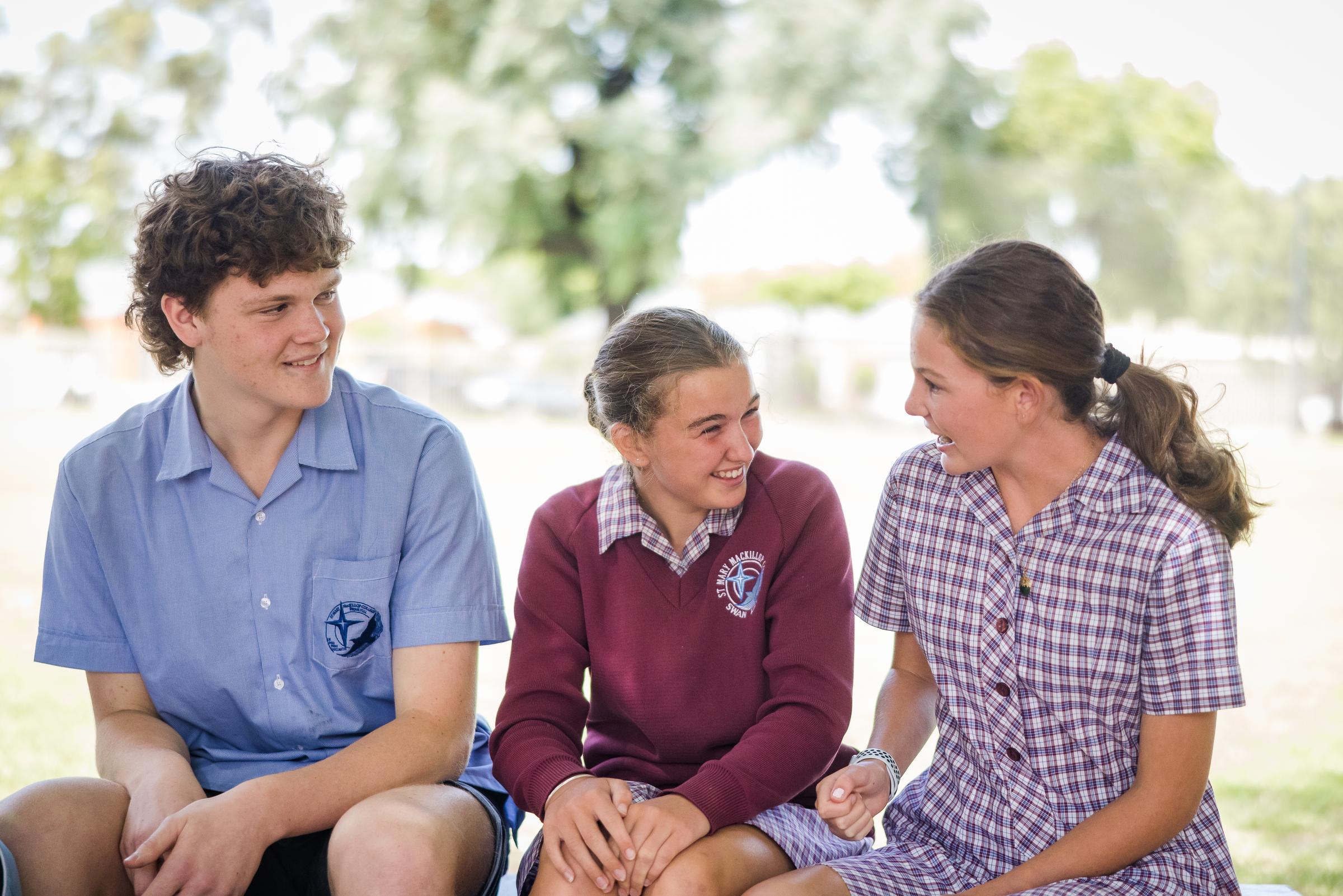DEPUTY PRINCIPAL - TEACHING & LEARNING REPORT
MR NATHAN LANE - DEPUTY PRINCIPAL: TEACHING & LEARNING

DEPUTY PRINCIPAL - TEACHING & LEARNING REPORT
MR NATHAN LANE - DEPUTY PRINCIPAL: TEACHING & LEARNING


Vision for Teaching and Learning at St Mary MacKillop College - a statement that drives the development of a high performance learning culture at SMMC
At St Mary MacKillop College we have high expectations of our students as we equip them with the knowledge, skills and dispositions for lifelong learning. We pursue excellence through a teaching and learning environment that is inclusive, engaging and encourages growth. We value collaboration, innovation and building strong relationships.
We have come to the end of another term. As I write this newsletter article I am having a wonderful time in Melbourne on the Year 11 camp. This is my first time on this camp and there have been many highlights. On Tuesday afternoon we visited the Mary MacKillop Heritage Centre in East Melbourne and we were also taken on a tour of the Australian Catholic University campus near the Centre. On Wednesday we visited the Melbourne Holocaust Museum and listened to Sarah Saaroni, a 97 year old survivor of the holocaust, recount her experiences. On Thursday we were taken on a tour of the Shrine of Remembrance.
As Term 2 concludes, I would like to take this opportunity to thank all students, staff and members of our community for their dedication and contribution to our wonderful school throughout the term. I wish all members of our community a safe and enjoyable holiday break.
Semester One Reports
At St Mary MacKillop College we recognise the importance of ongoing feedback to students about their academic progress. In light of this we have the Parent Access Module (PAM) where grades for assessment tasks are published and feedback is provided to inform students of their achievements and areas for improvement. We encourage students and parents to access the portal on a regular basis and to have conversations at home around their child’s academic progress. End of Semester reports have now been completed and will soon be available online via PAM. I encourage parents and guardians to take the time to discuss these with your child.
To review detailed feedback on each assessment task, please refer to the individual subject Learning Area, accessible via PAM. Hardcopies of End of Semester reports will only be printed and posted home over the holidays, if specifically requested.
If any parent is unable to access their child’s report online, or does not receive their specifically requested hardcopy by the beginning of Term 3, please contact the Front Office.
All Victorian government and Catholic schools use the Victorian Curriculum F-10 for determining achievement levels for students in Years 7 to 10. Schools are required to report on the achievement of all students including those with disabilities ‘without exception’. The Victorian Curriculum achievement graphs contain some significant changes, with an explanation of new terms and codes under each graph. If you have any questions or concerns with the reporting of Victorian Curriculum levels for your child, please contact me in Term 3.
Please note: some students who have a Personal Learning Program (PLP) may have an expected achievement level set which differs from their year level in some subjects. This will be explained in more detail at the parent’s next PSG meeting with Sally Op’t Hoog (Learning Diversity Leader).
Below is an explanation of the grading scale for assessment tasks:
Year 7 to 12
End of Semester Reports: Grading for Assessment Tasks
Assessments at Year 7 – 12 use the following grading criteria:
VH (Very High): All criteria addressed to a very high standard or 90 – 100%
H (High): Most criteria addressed to a high standard or 75 – 89%
M (Medium): Criteria addressed to a medium standard or 55 – 74%
L (Low): Criteria addressed to a low standard or 40 – 54%
VL (Very Low): Criteria addressed to a low standard or 30 – 39%
NY (Not Yet): Student is not eligible for a result due to: Non-submission of work by the due date; lowest standard not met; copying or; plagiarism; or below 30%
LS (Late Submission): Late but Satisfactory
NA (Not Assessed): Task Not Assessed
AB (Absence): Absent for task
End of Semester Result for VCE units:
S – Satisfactory. Assessment tasks completed.
N – Not Satisfactory. Insufficient work completed, or work below standard.
Please note: the results for some assessment tasks for VCE subjects that have been completed at the end of this term will not appear on the end of semester report. The result will appear on the report for semester two. Parents will see 'in progress' for the Learning Outcomes and a conditional 'S' unit result. This result may change if the student doesn't meet the key skills and knowledge required for the task, and parents will be notified.
Learning Habits Rubric
On our reports, learning habits are reported using the rubric here. The aim of reporting on learning habits is to provide feedback on the progress and growth of students as learners. Our focus is to provide students with the necessary skills they need to be self-regulated learners, empowered to maximise their opportunities to grow and learn.
Learning Conversations at Home
As mentioned above, we encourage parents to engage their child in conversations about their end of semester report and learning progress. The report should be read in conjunction with the feedback for assessment tasks that is available on PAM. Semester Two provides the perfect opportunity for students to ‘begin again’, to reflect on their learning from Semester One, to identify strengths and areas for improvement, and to set goals for the term.
What did you learn at school today? What are you enjoying most at school? What challenges are you facing with your learning? These open ended questions will hopefully generate some interesting insights into your child’s experiences at school.
Subject Selection Process
All students from Years 8 to 11 have now completed their initial subject selections for 2024. We have used the online Web Preferences system for several years now and it seems to work very effectively, but if you have any feedback or concerns please contact the Pathways team. Many thanks to our wonderful Pathways Team, Ms Looney and Ms Brady, for their work supporting our students in their subject selections and for all the administrative tasks involved in the process. It is important that students print and return the receipt of their subject selections to the Pathways office.
During the holidays I will review the applications from students who would like to accelerate into a VCE subject in 2024. Students who have not met the acceleration criteria will be contacted by me at the start of Term 3 and be asked to select an alternative subject.
Once the final blocking of subjects to be offered in 2024 is completed late next term, all students in Year 11 and Year 12 will have subject counselling interviews in November. Parents or guardians are strongly encouraged to attend these interviews.
Reflections on Learning from Semester 1
What is your favourite subject and why?
Explain the highlight from your learning in Semester 1.
Explain the result you were most proud of achieving in Semester 1.
Outline the goals you have set for your learning in Semester 2.
Academic Recognition Program
This week teachers nominated students from their Year 11 and Year 12 classes for academic and endeavour recognition. The following students were nominated:
Year 11
Academic Recognition
Christian Anderson, Grace Doherty, Sophie Fasham, William Gilchrist, Emily Hall, Lucy McCann, Tess Meney, Brooke Pearson, Harry Scott, Trinity Sutton, Kate Whorwood
Endeavour Recognition
Gabby Atkinson, Evita Caruso, Sophie Fasham, Bradley Greenham, Abbey Houlihan, Tess Meney, Lakeisha O'Sullivan, Charlotte Perry, Jorja Plant, Maeve Sheldrick, Trinity Sutton, Zoe White, Kate Whorwood
Year 12
Academic Recognition
Charlotte Angus, Ava Cummins, Tanisha Frazzica, Emily Free, Dustin Holmes, Danika Meehan, Thanh Pham, Angelica Watson, Dakota Wilckens
Endeavour Recognition
Abbey Buckingham, Ava Cummins, Gabi Davis, Tanisha Frazzica, Thanh Pham, Nikita Rogers, Dakota Wilckens
Thank you to the Academic Committee for organising this initiative.